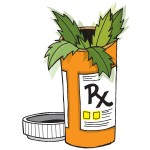 A very tough part of being a responsible medical marijuana patient is talking to children about it. I recently received an e-mail asking me to cover this topic, and so I went to the best place possible to receive the answer — The Mothers Against Misuse and Abuse Clinic in Portland, Oregon. Mothers Against Misuse and Abuse (MAMAS) is the clinic I go to for all of my medical marijuana needs; classes, doctors, forms, etc. I was there yesterday renewing my card, and I found a great educational pamphlet dealing with medical marijuana and children. Here is the pamphlet transcribed below:
A very tough part of being a responsible medical marijuana patient is talking to children about it. I recently received an e-mail asking me to cover this topic, and so I went to the best place possible to receive the answer — The Mothers Against Misuse and Abuse Clinic in Portland, Oregon. Mothers Against Misuse and Abuse (MAMAS) is the clinic I go to for all of my medical marijuana needs; classes, doctors, forms, etc. I was there yesterday renewing my card, and I found a great educational pamphlet dealing with medical marijuana and children. Here is the pamphlet transcribed below:
Through the Eyes of a Child
As a parent your behavior will determine, more than any other factor, how your child will approach the use of drugs. Think carefully about the messages you send.
Children need to see that you approach all drug use as a serious decision that requires careful consideration. Even young children can understand how to be careful with drugs, and a 10 year old can learn to relate dosage to body weight. The care that you show regarding all drug use will go far to prepare your children for the many choices facing them regarding drugs.
Your child eventually will decide if, and how, he or she will use a drug. Whether now or in the future, it is almost certain your child will be making choices about drinking beverages with sugar and caffeine, using an over the counter pain killer, tobacco, alcohol, or drugs that are suggested by a doctor, advertised on television or sold on the street. It is in your child’s best interests to understand the risks of all drug use.
Learn how to use the ‘Drug Consumer Safety Guidelines’ so that you can show your children the skills they need to evaluate all drug use. Know where to get accurate information, and the questions to ask your doctor or pharmacist.
DRUG CONSUMER SAFETY GUIDELINES
1. Identify the name of the chemical.
2. Determine where it is working in your body (main effects, side effects, and adverse reactions).
3. Understand the correct dosage and administration.
4. Realize what drug interactions will occur with what you eat, drink, or other drugs you may be using.
5. Know if allergic reactions can occur, the symptoms and when to seek help.
6. Find out if it can produce tolerance and know the signs.
7. Determine if it can produce drug dependence.




